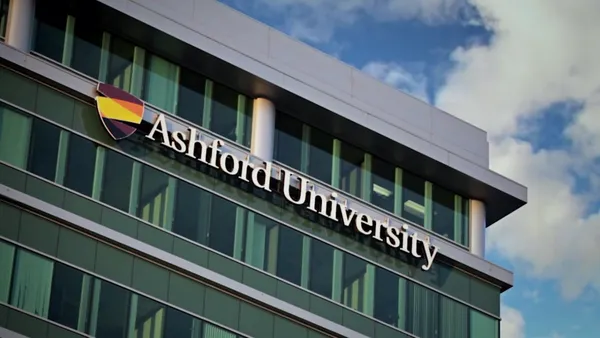Dive Brief:
- Citron Research — a firm whose founder is known for shorting Wall Street stocks — took aim at Grand Canyon Education (GCE) in a report late last month, alleging "Enron-like fraud" in its relationship with Grand Canyon University (GCU).
- The report claims GCE disproportionately benefits from revenue that GCU pays to it through a shared-services agreement while shifting some expenses and liabilities to the university. This maneuver intends to "artificially inflate" the company's stock price, it argued.
- GCE pushed back on the report in a statement, saying the university is independent. It also said the report made "various speculative claims" about the university's financial health.
Dive Insight:
GCE's stock price lost more than 10% of its value between Jan. 27, the day the report was published, and when the markets closed on Feb. 6. According to the Arizona Republic, Citron founder Andrew Left has shorted GCE's stock, an attempt to make money off a company whose stock price falls.
Citron's report points to several components of a decision this fall by the U.S. Department of Education concerning the university's request to separate from GCE as a nonprofit institution. While the department approved the change of control, it did not sign off on the university's bid to be treated as a nonprofit for the purpose of receiving Title IV funding.
The department, in explaining its decision, claimed the move to separate GCU and GCE was designed "to drive shareholder value" for the publicly traded company and that it keeps the university as a "captive client." It also called out the overlapping leadership of the two entities.
In a statement criticizing the department's decision, the university pointed out that the IRS and its accreditor, the Higher Learning Commission, had approved the transaction. It also said the arrangement has benefited the institution.
The university has invested $195.4 million into its educational infrastructure in the 18 months since the separation, a GCU spokesperson told Education Dive in an email last month. In its response to the Citron report, the university said its net assets had grown by $387.6 million in the fiscal year ending June 20, 2019.
Trace Urdan, a managing director with investment bank and consulting firm Tyton Partners, who studies online program management companies, called the report "wrongheaded" and said it is "more sensational than substantive."
While he is "sympathetic to the notion that there's an insufficient separation" between the university and the services company, Urdan also told Education Dive that he doesn't agree with the parts of the argument that suggest "that there's something substantively wrong with the value or the product that GCU is bringing to market."
Jeff Silber, managing director at BMO Capital Markets, pointed out in an interview with Education Dive that the university's financial position may not be as dire as Citron's report suggests.
"Some of the accusations about the university being under some stress financially at least as of June 30, which is the latest we have, (don't) seem to be accurate," he said.













